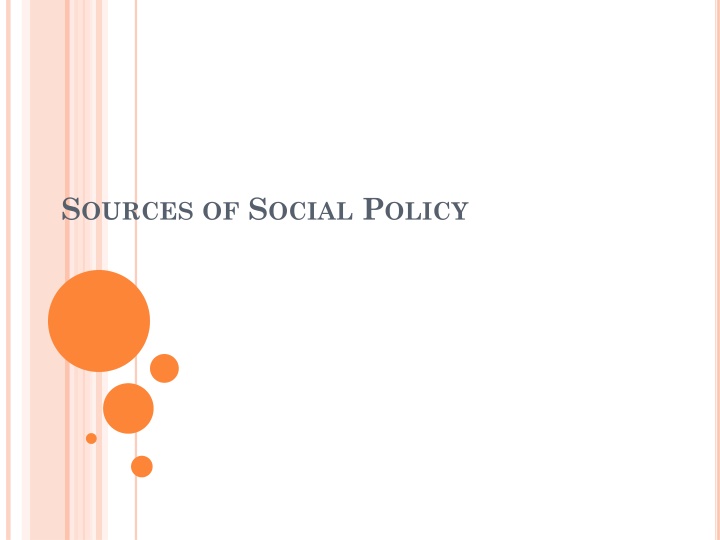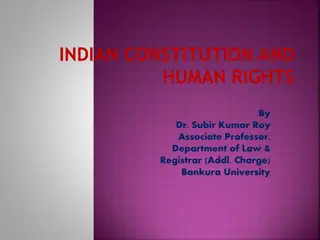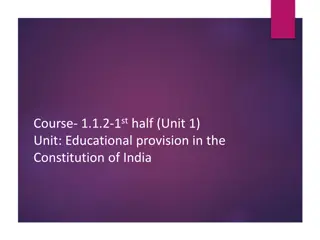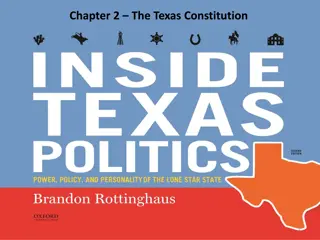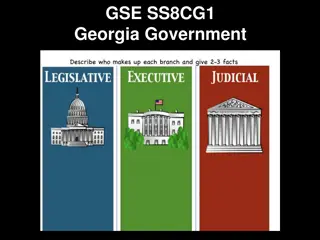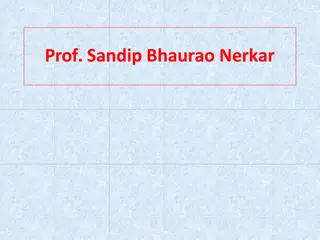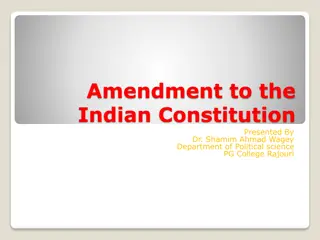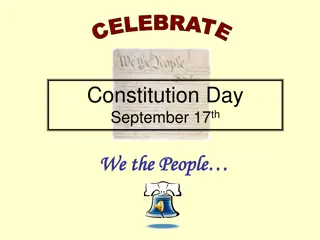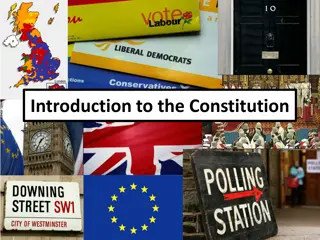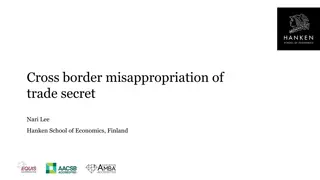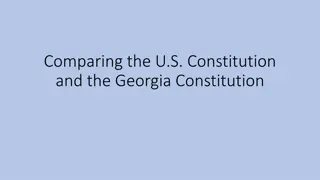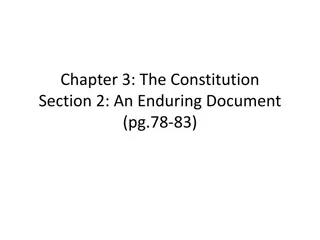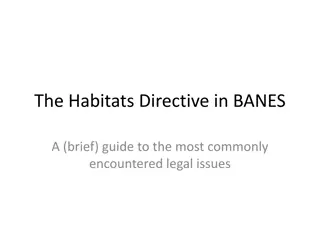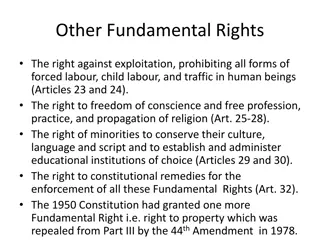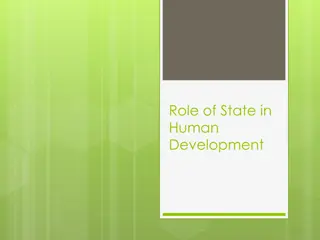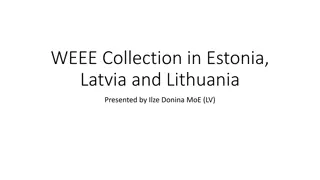Overview of Directive Principles of State Policy in Indian Constitution
Directive Principles of State Policy (DPSP) in the Indian Constitution encompass social, economic, and political programs aimed at realizing ideals of justice, liberty, equality, and fraternity. They are non-justiciable but guide the state in legislative matters. Classified into Socialistic, Gandhian, and Liberal-Intellectual principles, DPSP emphasize welfare, social justice, and equality. These principles promote the welfare of citizens, secure livelihoods, and aim to provide justice and legal aid to the underprivileged.
Uploaded on Sep 24, 2024 | 3 Views
Download Presentation

Please find below an Image/Link to download the presentation.
The content on the website is provided AS IS for your information and personal use only. It may not be sold, licensed, or shared on other websites without obtaining consent from the author.If you encounter any issues during the download, it is possible that the publisher has removed the file from their server.
You are allowed to download the files provided on this website for personal or commercial use, subject to the condition that they are used lawfully. All files are the property of their respective owners.
The content on the website is provided AS IS for your information and personal use only. It may not be sold, licensed, or shared on other websites without obtaining consent from the author.
E N D
Presentation Transcript
DIRECTIVE PRINCIPLES OF STATES POLICY (DPSP) Enumerated in Part-IV of the Constitution Article 36-51 Borrowed the idea from Irish Constitution of 1937 These are Novel features of the Indian Constitution Soul of the constitution
Conscience of the constitution Denotes the ideals that state should keep in mind while formulating the policies and enacting laws Constitutionals instructions and recommendations to state in legislative, executive and administrative matters
DPSP constitutes a very comprehensive economic, social and political programmes for modern democratic state They aim at realising the high ideals of justice, liberty, equality and fraternity They embody the concept of welfare state Seek to establish economic and social democracy
They are non-justiciable in nature However, they help the courts to examine and determine the constitutional validity of a law
CLASSIFICATION OF DPSP Socialistic Principles Gandhian Principles Liberal-Intellectual Principles
SOCIALISTIC PRINCIPLES These principles reflects the ideology of socialism They lay down the framework of democratic socialistic state, aim at providing social and economic justice, and the path towards welfare state
To promote the welfare of the people by securing social order permeated by justice-minimize inequalities in income, status, facilities and opportunities (Art. 38) To secure the right to adequate means of livelihood for all citizen (Art. 39) To promote equal justice and to provide free legal aid to the poor (Art. 39 A)
To secure right to work, to education and public assistance in cases of unemployment, old age, sickness and disablement (Art. 41) To make provision for just and humane condition for work and maternity relief (Art. 42) To secure a living wage, a decent standard of life and social and cultural opportunities for all workers (Art.43)
To take steps to secure the participation of workers in the management of industries (Art.43A) To raise the level of nutrition and the standard of living of people and to improve public health (Art. 47)
GANDHIAN PRINCIPLES Based on Gandhian ideology Represent the programme of reconstruction enunciated by Gandhi
To organise village panchyatas and endow them with necessary powers and authority to enable them to function as units of self-government (Art. 40) To promote cottage industries on an individual or co- operation basis in rural areas (Art.43) To voluntary formation, autonomous functioning, democratic control and professional management of co-operative societies (Art. 43 B)
To promote the educational and economic interests of SCs, STs, and other weaker sections of the society and to protect them from social injustice and exploitation (Art.46) To prohibit the consumption of intoxicating drinks and drugs which are injurious to health (Art. 47) To prohibit the slaughter of cows, calves and other milch and draught cattle and to improve their breeds (Art.48)
LIBERAL-INTELLECTUAL PRINCIPLES Represents the ideology of liberalism To secure far all citizens a uniform civil code throughout the country (Art.44) To provide early childhood care and education for all children until they complete the age of six years (Art. 45) To organise agriculture and animal husbandry on modern and scientific lines (Art. 48)
To protect and improve the environment and to safeguards forests and wild life (Art. 48 A) To protest monuments, places and objects of artistic or historic interest which are declared to be of national importance (Art. 49) To separate the judiciary form the execution in the public service of the state (Art.50) To promote international peace and security and maintain just and honorable relations between nations (Art. 51)
IDEOLOGICAL AND PHILOSOPHICAL BASE Conservative Liberal Social Democrats Neo-liberal
RATIFICATION OF INTERNATIONAL DECLARATIONS Universal Declaration of Human Rights, 1948 United Nations Convention on Rights of Child, 1990 Rio Declaration on Environment and Development, 1992
MILLENNIUM DEVELOPMENT GOALS, 2000-01 1. Eradicate Extreme Poverty and Hunger 2. Achieve Universal Primary Education 3. Promote Gender Equality and Empower Women 4. Reduce Child Mortality 5. Improve Maternal Health 6. Combat HIV/AIDS, Malaria and Other Diseases 7. Ensure Environment Sustainability 8. Global Partnership for Development
GENESIS OF THE POLICY Conflicts about Choice of society Contemporary societies are characterised by a plurality of opinions
PROCESS OF POLICY FORMATION Initiation 1. Information 2. Consideration 3. Decision 4. Implementation 5. Evaluation 6. Termination 7.
Deciding to decide (Issue search or agenda-setting) Deciding how to decide (Issue filtration) Issue definition Forecasting Setting objectives and priorities Options analysis Policy implementation, monitoring and control Evaluation and review Policy maintenance, succession or termination 1. 2. 3. 4. 5. 6. 7. 8. 9.
Most accepted model of policy process Agenda Setting 1. Formulation 2. Implementation 3. Evaluation 4.
ESSENTIALS FOR POLICY Value oriented: Equity & Justice Representative Participatory Need based Right based Sustainable
ACTORS IN POLICY MAKING PROCESS State- Government International Organisation: Pressure Groups/Lobbying/Network Academic & Research Institutions Market Forces
